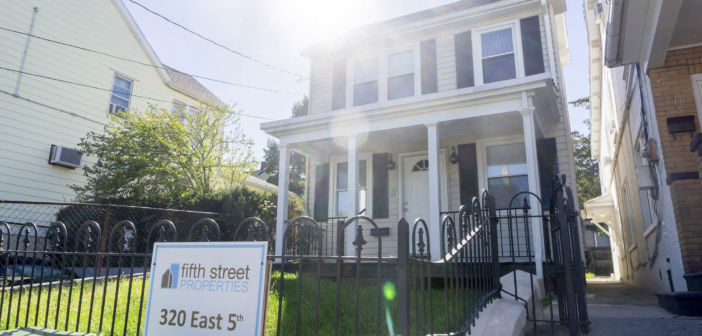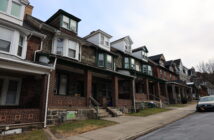Living off campus is common among Lehigh juniors and seniors. With the construction of more on-campus dorms and the enforcement of maximum occupancy laws in off-campus houses, upperclassmen might reconsider their options.
President John Simon’s Path to Prominence outlines a series of initiatives, which includes increasing enrollment by 1,000 undergraduate students and 500 to 800 full-time graduate students over the course of seven years.
In order to bring more students to campus, the construction of new residential communities is necessary.
Ozzie Breiner, the director of residential services, said approximately 65 percent of students live on campus and 35 percent of students live off campus.
“The idea is there may be a small percentage more of students who live on campus,” he said. “But we don’t want everyone to live on campus.”
The ultimate goal is to maintain the ratio of students on campus to students off campus that exists right now.
The blueprints of the new buildings illustrate a residential community solely for upperclassmen near Broughal Middle School and Mohler Lab.
Breiner said professional personnel will oversee the residential facility, but it will be managed by the developer, not Lehigh.
“The new buildings look really nice, I would totally live there,” Nic Thomson, ’20, said after looking at the blueprint model. “You’d never have to walk up the hill again.”
Construction projects will not be the only changes to housing.
Bethlehem officials are encouraging landlords to incorporate maximum occupancy for guests in lease agreements.
The Bethlehem Economic Development Committee met with Bethlehem police, Mayor Robert J. Donchez, South Side landlords and Simon on Sept. 25 to discuss rental regulations.
Campus Hill, a popular rental company among students, declined to comment on the matter.
Breiner said students might get fed up with stricter policies, but he said only time will tell.
“My intuition is there will always be people who prefer to live off campus as a senior than on campus,” Breiner said. “It’s a next step in their minds.”
Craig Hynes, Bethlehem’s chief building inspector, said the Committee of Economic Development will also be looking into the legality of displacing residents if they receive a certain number of noise violations. He said the “disturbances” clauses in housing agreements serve as grounds for displacement.
Hynes said landlords were hesitant about the suggested enforcement and suggested the committee contact lawyers.
“What I can say is that when it comes to efforts to curb behavior that is disruptive to the community, illegal and in violation of the Student Code of Conduct,” Lori Friedman, Lehigh’s director of media relations, wrote in an email, “we believe that to be effective it must involve all stakeholders, including Lehigh leadership, the city of Bethlehem, members of the community, law enforcement, landlords and, perhaps most importantly, students themselves.”
The Committee of Economic Development will find out by the end of next week if it is in its jurisdiction to implement these regulations.
Sergeant Simon Boddie from the Bethlehem Police Department said he was completely unaware of these regulations.
“Until it’s officially decided and they send out a memo,” Boddie said, “we don’t get any of that information.”






Comment policy
Comments posted to The Brown and White website are reviewed by a moderator before being approved. Incendiary speech or harassing language, including comments targeted at individuals, may be deemed unacceptable and not published. Spam and other soliciting will also be declined.
The Brown and White also reserves the right to not publish entirely anonymous comments.
1 Comment
There are many reasons why students prefer to escape living in Lehigh supplied housing and live in town. Some of them, which have been the subject of numerous recent B & W articles and commentary have to do with alcohol and Lehigh’s costly and oppressive social policy rules.
Independent of that is the fact that much of Lehigh’s dormitory stock provides substandard accommodations and are somewhat akin to overcrowded slum living.
Many double rooms are too small to comfortably accommodate two roommates, and should be single occupancy rooms.
Worse yet, some dormitory sections fail to meet Pennsylvania’s minimum building code requirements.
The plumbing code requires that a minimum of one toilet be provided per 10 students in a dormitory section.
The code also requires a minimum of one shower per 8 students.
This page for the Centennial I complex states that each section accommodates 22 students.
https://www1.lehigh.edu/housing/buildings/centennial-i-complex
Thus this means that there should be a minimum of three toilets available in each section to avoid violating the code.
If you look at the floor plans available on the above link, they show that only two toilets are available for Congdon, Leavitt, McConn, and Smiley.
It is unclear from the drawings whether the showers have multiple shower heads and accommodate more than one person at the same time. If not, then this too is a code violation
Thus these dorms should be cited by the City of Bethlehem for code violations.
If you look at the 3D drawing for Centennial I at:
http://www.lehigh.edu/~inrsd/pdf/roomlayouts/centennial-I-double.pdf
there is barely enough room to get around in it when it is filled up with the furniture shown in the drawing.
McClintic Marshall is even worse with regards to the amount of space in the rooms. But at least there are more toilets available.
========
Several years back, only first year students were required to live in the dorms.
Because of the appalling slum conditions I describe above, Lehigh found itself with empty dorm rooms as even second year students opted for town living to avoid these conditions and other constraints.
This is when Lehigh adopted that mandate that all first and second year students had to live in Lehigh supplied housing.
Lehigh concocted the dubious rationale that this was to instill a feeling of community. This, of course, was a blatantly phony argument. It all had to do with the well worn phrase: “follow the money!!!!”
Living in town allows you to enjoy a variety of the simple pleasures of life.
Just think. You can invite a few friends over to where you are living to celebrate your birthday with a cake that has a few candles on it WITHOUT living in fear that the LUPD will raid you and cite you with a $300 fine for those candles.